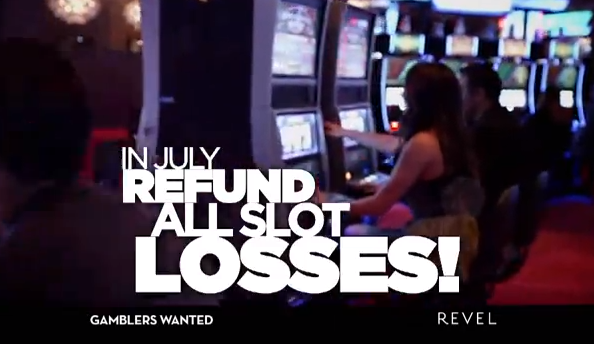Casino’s “You Can’t Lose” Refund Promotion Is Really Just Meant To Keep You Gambling

Revel’s ads say the casino will refund all slot losses during the month of July, but don’t say you’ll get the refund over the course of 20 weeks, and that it’s in the form of slot machine credit, not cash.
Take, for example, the currently running “You Can’t Lose” refund offer being pushed by the Revel Atlantic City casino. The ad for the promotion is below, but it’s loud and probably not something you want your co-workers hearing. So here’s what is said in the ad’s voice-over:
“When Revel opened, we made mistakes. Now, we’re asking for a second chance. So we are going to make you an offer you can’t refuse. You can’t lose! All July long, we’re going to refund all slot losses. That’s right — if you win, you win. If you lose, we’ll give it all back. And we’re also going to match all slot offers from our competitors. You really can’t lose. We want a second chance, and to earn it, we’re giving you a second chance.”
That sounds like a pretty sweet deal, so you know there has to be a catch.
And here it is, in remarkably fine print on the bottom of this page on the Revel website:
See Revel Card Desk for details. Must be 21 or older. Revel Card required. Minimum cumulative loss of $100 by July 31, 2013. Loss refunds are capped at $100,000. Only slot, video poker and electronic table game play is eligible. Losses are refunded over 20 weeks beginning August 5, 2013 in the form of Free Slot Play.
It’s that last sentence that’s the real catch: Gamblers don’t get an immediate and full refund in cash; they get slot-machine credit and it’s doled out over the course of 20 weeks.
To some people, that might sound like an okay deal, especially if they are Atlantic City regulars who like to play the slots. But the real question here is whether Revel has gone too far in hiding these conditions in their ads.
The Newark Star-Ledger’s Bamboozled column points to a Federal Trade Commission FAQ on advertising for guidance on how advertisers should handle fine print.
“When the disclosure of qualifying information is necessary to prevent an ad from being deceptive, the information should be presented clearly and conspicuously so that consumers can actually notice and understand it,” reads the document. “A fine-print disclosure at the bottom of a print ad, a disclaimer buried in a body of text unrelated to the claim being qualified, a brief video superscript in a television ad, or a disclaimer that is easily missed on a website are not likely to be effective. Nor can advertisers use fine print to contradict other statements in an ad or to clear up misimpressions that the ad would leave otherwise.”
So, clarifies the FTC, an ad that states “Lose 10 pounds in one week without dieting” can not wipe away that claim — though many have tried — with fine print that reads “Diet and exercise required.”
Bamboozled also cites New Jersey law requiring fine-print disclaimer to “be set forth in a type size and style that is clear and conspicuous relative to the other type sizes and styles used in the advertisement.”
One consumer law attorney says the Revel ads may be in violation of the state’s Consumer Fraud Act.
“The video print is minuscule and even if it were enormous, it flashes on and off so quickly it is impossible to read,” she explains.
A former director of the New Jersey Division of Consumer Affairs takes issue with the promotion’s claims of a refund.
“The true definition of a refund is, ‘I give you the money back and you can do whatever you want with it,’” he tells Bamboozled. “In this case, they’re saying, ‘We give you the money back and you can do what we want you to do with it.’”
Of course, this sort of not-a-refund refund is nothing new. A number of retailers only give store credit on returns, or have promotions — like Best Buy’s Buy Back program — where the only option for receiving payment is in the form of a store gift card. The idea here is not to give customers back the money they were promised, but to encourage them to keep spending that money (and more) in the same location.
As the ad states in print a lot larger than the terms and conditions, “Gamblers wanted.”
The casino, which opened in spring 2012 and had to file for bankruptcy protection less than a year later, doesn’t appear eager to offer any further clarification on this promotion.
Bamboozled: Revel Casino’s pitch to refund slot losses craps out in the fine print, critics say [NJ.com]
Want more consumer news? Visit our parent organization, Consumer Reports, for the latest on scams, recalls, and other consumer issues.

